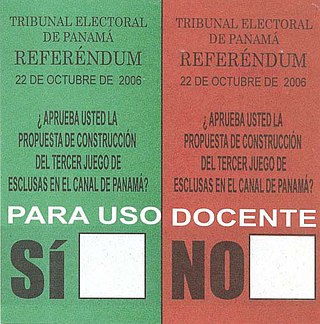
Voting is a method by which a group, such as a meeting or an electorate, convenes together for the purpose of making a collective decision or expressing an opinion usually following discussions, debates or election campaigns. Democracies elect holders of high office by voting. Residents of a jurisdiction represented by an elected official are called "constituents", and the constituents who choose to cast a ballot for their chosen candidate are called "voters." There are different systems for collecting votes, but while many of the systems used in decision-making can also be used as electoral systems, any which cater to proportional representation can only be used in elections.
"None of the above" (NOTA), or none for short, also known as "against all" or a "scratch" vote, is a ballot option in some jurisdictions or organizations, designed to allow the voter to indicate disapproval of the candidates in a voting system. It is based on the principle that consent requires the ability to withhold consent in an election, just as they can by voting "No" on ballot questions. It must be contrasted with "abstention", in which a voter does not cast a ballot.
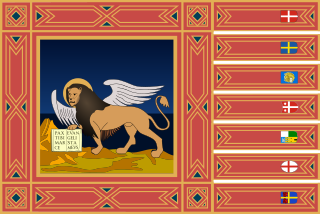
The politics of Veneto, a region of Italy, takes place in a framework of a semi-presidential representative democracy, whereby the President is the head of government, and of a pluriform multi-party system. Executive power is exercised by the Regional Government. Legislative power is vested in both the government and the Regional Council.

This page gathers the results of elections in Veneto.

The Politics of Campania takes place in a framework of a presidential representative democracy, whereby the President of Regional Government is the head of government, and of a pluriform multi-party system. Executive power is exercised by the Regional Government. Legislative power is vested in both the government and the Regional Council.
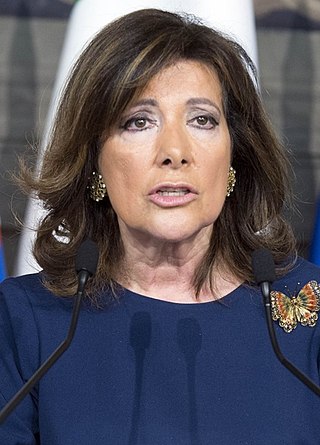
Maria Elisabetta Alberti, known by her married name as Maria Elisabetta Alberti Casellati, is an Italian lawyer and politician, serving as Minister for Institutional Reforms since 2022. She was President of the Italian Senate from 2018 to 2022. She was the first woman ever to have held this position. Casellati is a long-time member of the liberal-conservative party Forza Italia and served as Undersecretary of Health and Justice in previous governments. In 2022, she was nominated as candidate for President of Italy by the centre-right coalition.

The 2018 Italian general election was held on 4 March 2018 after the Italian Parliament was dissolved by President Sergio Mattarella on 28 December 2017. Voters were electing the 630 members of the Chamber of Deputies and the 315 elective members of the Senate of the Republic for the 18th legislature of the Italian Republic since 1948. The election took place concurrently with the Lombard and Lazio regional elections. No party or coalition gained an absolute majority in the parliament, even though the centre-right coalition won a plurality of seats as a coalition, and the Five Star Movement (M5S) won a plurality of seats as an individual party.

The Italian electoral law of 2015, also known as Italicum, was an Italian electoral law passed in 2015. The law, which came into force on 1 July 2016, regulated only the election of the Chamber of Deputies, replacing the Italian electoral law of 2005, which had been ruled partly unconstitutional by the Constitutional Court of Italy in December 2013. It provided for a two-round system based on party-list proportional representation, including a majority bonus and a 3% election threshold. Candidates would have run in 100 multi-member constituencies using open lists. The largest party which won over 40% of the vote would automatically win a majority of seats; if no party won 40% of seats, a second round of voting would be held between the two largest parties, with the winner of the second round winning a majority of seats. The name "Italicum" was coined in 2014 by Democratic Party secretary and later Prime Minister of Italy, Matteo Renzi, who was one of the legislation's main proponent.
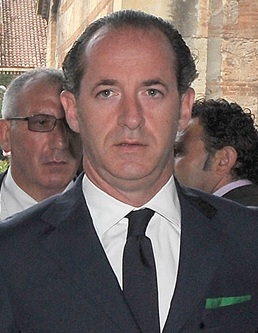
The Venetian regional election of 2015 took place in Veneto on 31 May 2015, as part of a big round of regional elections in Italy. Venetian voters elected their President and their Regional Council, whose members had been reduced to 51, including the President.

Roberto Fico is an Italian politician and member of the Five Star Movement. He served as the Chairman of the RAI Supervision Commission from 2013 to 2018 and President of the Italian Chamber of Deputies from 2018 to 2022.

The Italian electoral law of 2017, colloquially known by the nickname Rosatellum after Ettore Rosato, the Democratic Party (PD) leader in the Chamber of Deputies who first proposed the new law, is a parallel voting system, which acts as a mixed electoral system, with 37% of seats allocated using a first-past-the-post electoral system and 63% using a proportional method, with one round of voting. The Chamber and Senate of the Republic did not differ in the way they allocated the proportional seats, both using the largest remainder method of allocating seats.

The 2019 Abruzzo regional election took place on 10 February 2019. The election was for all 29 elected seats of the Regional Council of Abruzzo as well as the President of the region who, along with the second placed presidential candidate, would also become members of the Regional Council.

The 2020 Campanian regional election took place in Campania on 20 and 21 September 2020. It was originally scheduled to take place on 31 May 2020, but it was delayed due to the COVID-19 pandemic in Italy.

The 2020 Apulian regional election took place in Apulia, Italy, on 20 and 21 September. It was originally scheduled to take place on May 31, 2020, but it was delayed due to the COVID-19 pandemic in Italy.
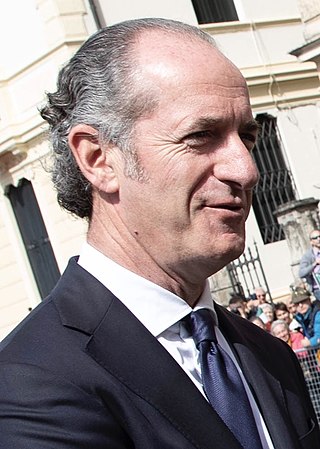
The 2020 Venetian regional election took place in Veneto on 20 and 21 September 2020.

Estonia's 2001 presidential election took place from August 27 to September 21, 2001. After three rounds of voting in the Riigikogu and two rounds of voting in the electoral college, Arnold Rüütel was elected President.
The next Italian general election will occur no later than 22 December 2027, although it may be called earlier as a snap election.
The election of the President of the Senate of the Republic who would serve through the Legislature XIX of Italy took place on 13 October 2022, over three weeks after the 2022 Italian general election. It resulted in Ignazio La Russa being elected President.

The election of the President of the Italian Chamber of Deputies who would serve through the legislature XIX of Italy took place on 13 and 14 October 2022, almost four weeks after the 2022 Italian general election. Lorenzo Fontana, a member of the Lega was elected on the fourth ballot with 222 votes.

The election of the President of the Chamber of Deputies who would serve through the legislature XVIII of Italy took place on 23 and 24 March 2018, weeks after the 2022 Italian general election. Roberto Fico was elected on the fourth ballot following an agreement between the Five Star Movement and the centre-right coalition.















